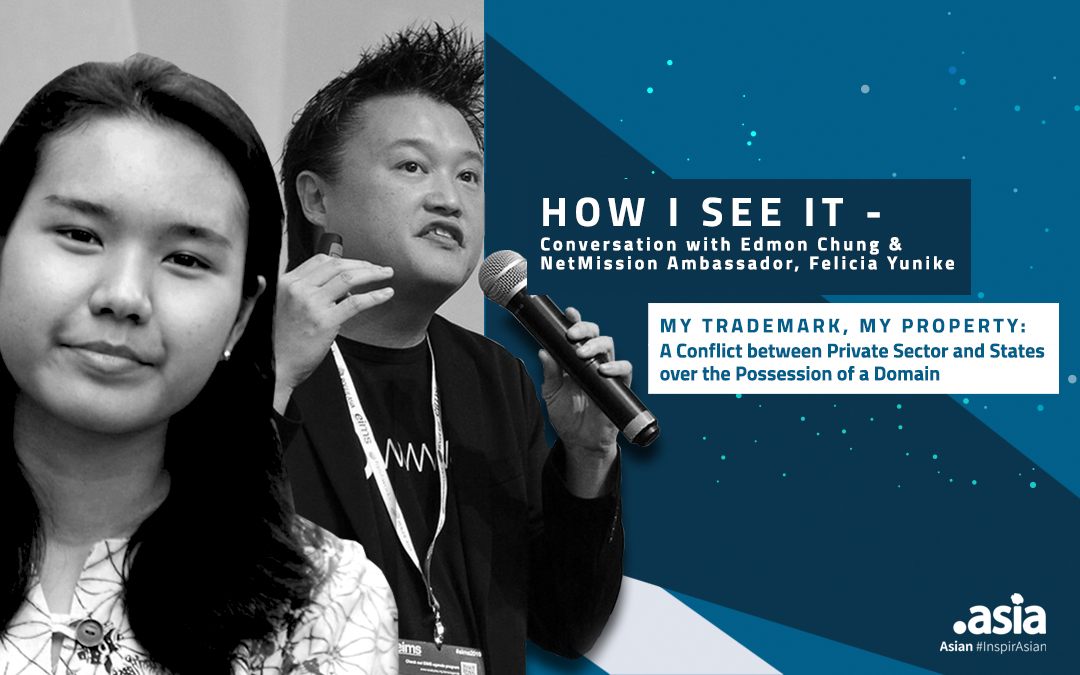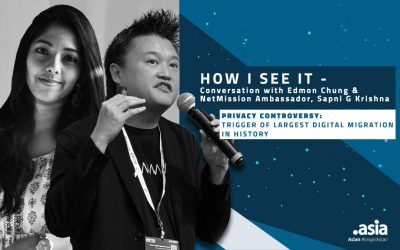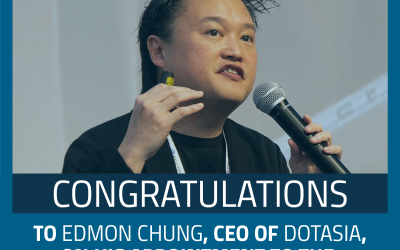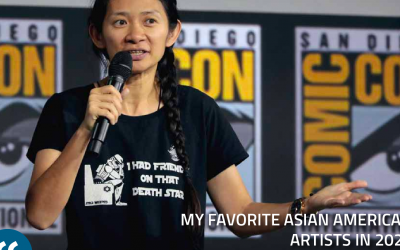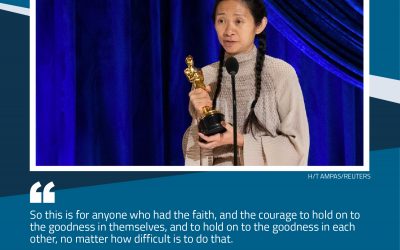This is a discussion about an issue that straddles two hugely different areas — trademark and domain names. And, one that is even further complicated by a controversial contention between the private sector and sovereign states over a 7 year-long battle for an Internet domain name.
A trademark is known as intangible property, meaning that it is a property with no physical form but it has commercial value. A domain name is both the name and the address for Internet users to navigate to and access information from a company’s website. The private sector protects their commercial assets including trademarks, meanwhile, states protect public interest including against abuse of geographical names. Where names overlap, we can easily identify the competing interests between the private sector wishing to register their trademark name as a domain name, and that of states looking to protect against misuse of a geographical name.
An interesting part of the conflict is that the nature of trademark versus domain registrations is hugely different, resulting in a very complicated process. Furthermore, throughout the proceedings, it appears that ICANN has a tendency to favor one party over the other. In the discussion, the Moderator brought up the case of .amazon where contention arose between the governments where the Amazon river ran was pitted against Amazon the big-tech company. Despite the political conflict, .amazon was eventually granted to Amazon the company, which the Moderator found quite phenomenal.
In this episode, Edmon Chung, the CEO of DotAsia Organisation, and Felicia Yunike, NetMission ambassador — a law student from Indonesia who is passionate about Internet governance and digital policy — are discussing the differing nature of trademark and domain names. The discussion will explore how the concerned parties were battling against one another.
“The core aspect of trademark rights is in line with the idea of freedom of expression. Neither of them is absolute. Since I lean into the liberal side, in this sense, I am more for providing protection to freedom of expression than to trademark.”

Felicia:
How do you think we can harmonize trademarks and domain name systems? In a sense of a liberal perspective, how do you perceive a trademark?

Edmon:
Trademark and Domain Names are hugely different in many ways. In Trademarks, companies generally need to identify the class of goods and services the trademark pertains to, but in domain names there is no such limit. You can argue that “.org” must be a not-for-profit organization but in reality, we know that is not necessarily the case. Trademark laws also prevent confusingly similar trademarks to be registered.
A domain name is a name for an internet address, so the “uniqueness test” is more absolute. That is, as long as it is not exactly the same, you can register a second level domain name and use it accurately to arrive at the Internet resource properly. In considering Top Level Domains, ICANN does have a “string similarity” or confusability test that is modeled somewhat after the trademark confusingly similarity concept.
What is interesting though is that the core aspect of trademark rights is in line with the idea of freedom of expression. Neither of them is absolute. Since I lean into the liberal side, in this sense, I am more for providing protection to freedom of expression than to trademark. But there must always be a balance.
Overall, ICANN has a UDRP process, which was one of the first consensus policies produced by the multistakeholder ICANN process that specifically addresses the issue and worked well to minimizes the risk of trademark infringement and cybersquatting, while still offers ample opportunities for people to register domain names freely.

Felicia:
Do you see a Trademark as private property?

Edmon:
It certainly is but intellectual property rights are not absolute rights. For example, it may be possible to use the same name for your own brand to offer goods and services not provided (more importantly not registered) by the other company. Also freedom of expression rights provide that people can talk about, and fan clubs/user communities can use, the brand names and there are also provisions for even mocking the brand or used in political parodies, to express opinion or report news.

Felicia:
There are views that it seems ICANN favours Trademark holders, what is your view on that??

Edmon:
Based on the results from the UDRP and ICANN’s other rights protection mechanisms (RPM) so far, it seems to me it has been quite successful in curbing abuse while still providing space for freedom of expression.
The fact is, trademark rights owners have more tools at their disposal to protect their trademarks, for example going to the courts, so while there is a somewhat reasonable balance, it may appear that trademark holders more often than not get their way. Also, do not forget that the ICANN policies are developed by volunteers, Freedom of Expression advocates do not always have as much resources as trademark owners have in the policy-making process, so therein lies another dynamic. This is not a simple issue to fix, but speaks to the need for the continued evolution of the multistakeholder process.

Felicia:
Does prohibiting companies from using geographical regions as a domain is always a good idea?

Edmon:
In general, I do not support an outright prohibition on the use of geographical names, including country names in TLD or Second-Level Domains.

Felicia:
Why did ICANN grant Amazon the .amazon TLD over the objection from the governments? There appears again to be favouring commercial interests.

Edmon:
It is certainly a long story, the ICANN new gTLD process allows for the application of geographical names except for country names. One of the reasons it could come across as ICANN favoring commercial interests is because of the first come, first served nature of the application process, and that the objection process places the burden of proof of harm on the objecting party. When .amazon was applied for by Amazon the company, the Latin American countries felt that the name pertained to a part of their heritage, butas a collective of governments, it would be rather difficult for them to have applied for .amazon themselves based on the requirements of the new gTLD process. Therefore, they could only depend on the objections process, for which they have to essentially prove that Amazon’s use of .amazon would irreparably harm them to prevail.
Nevertheless, there was a GAC consensus advice to the ICANN board for rejecting the .amazon application, and the ICANN board accepted the advice and rejected .amazon initially. Amazon appealed through the ICANN accountability processes and won. I could be wrong and am certainly not an expert on it, but if I am not mistaken, it was based on a technicality of whether the Board seriously considered the GAC advice, considering ICANN’s mandate, expressed policies and the global public interest, before accepting it.
Amazon I think kept up the pressure by litigating against ICANN through the courts, while the Latin American governments continued to press their case through the GAC. In the end, I think ICANN tried to arbitrate a deal, or at least a discussion, but it didn’t quite work out. Finally, I think given that Amazon had satisfied all the new gTLD requirements, it was difficult for ICANN not to award it to them.

Felicia:
What kind of detrimental effect would Latin America suffer from if .amazon was granted by the ICANN?

Edmon:
That is precisely the problem and “disadvantage” I mentioned about favouring the applicant rather than the objector. The reality is that it is first of all difficult for an objector to prove that there will be detriment before the TLD is operational, and even then, cultural detriment is hard to evidence. So because based on the ICANN process, the governments were unable to apply and all they could do was to put forward an objection.
While the GAC did put forward a consensus objection, when the ICANN board considers the matter, it is hard to substantiate that harm will inevitably be inflicted on the peoples and cultures of the amazonian region. Therefore, based on the rules set out by ICANN, it probably had to conclude that giving Amazon a chance to run it, would be a better outcome for the Internet. Nevertheless, I am sympathetic to the governments in the amazonian region, we can in some way say that the ICANN process systematically disadvantaged them, and the cultural detriments may never be able to be revealed.

Felicia:
Have Amazon and the governments reached a mutual agreement after it was granted? If not, is .amazon considered legitimate despite the objections Amazon received?

Edmon:
I don’t think there was a mutual agreement. From the legal perspective, the ICANN probably made the safest decision where its entity is based in the US, and from there, there is a higher possibility that they will get sued by Amazon the company if they may be seen as not following their own policies and processes. To avoid its complexity, I think the ICANN likely made the safest decision for the organisation.

Felicia:
What are the efficient ways for the companies to tackle issues that go against the companies when it comes to registering their trademarks in domain names?

Edmon:
Some companies are quite protective about their brands but in general, everyone is allowed to register any domain name although they are subjected to dispute processes. However, if your name is generic enough, the best defense is the offense which is to apply for and use the domain. For communities, I would always suggest they apply, because, in this scenario, the best offense is the best defense.
That’s why we are supporting .kids associated with the children’s rights and welfare community. Without an application, if other companies apply for .kids, the community will be left with only the option of objecting to its use which not only costs a lot of money, it is very difficult to prove that a company’s use of “.kids” would inevitably harm the children’s rights and welfare community. By applying, it makes it possible for the community to at least put up a fight against the exploitation of the name by purely commercially driven interests.
This.Is.Asia Newsletter Issues
This.is.Asia December 2021 Issue
This.is.Asia October 2021 Issue
This.is.Asia October 2021 Issue
This.is.Asia August 2021 Issue
This.is.Asia August 2021 Issue
This.is.Asia June 2021 Issue
This.is.Asia April 2021 Issue
This.is.Asia February 2021 Issue

Beyond ASCII: The Vital Role of Email Address Internationalization in a Connected World
As the world becomes more connected, the need to use domain names and email addresses in local languages and scripts also continues to rise. EAI adoption has been growing in recent years, according to a Universal Acceptance Steering Group (UASG) report, as of May 2021, around 9.6% of email domains now support Email Address Internationalization (EAI), marking a noteworthy improvement from previous years. This progress indicates that EAI support is becoming more prevalent, ultimately making it simpler for individuals across the globe to utilize email addresses in their preferred languages and scripts
Continued Commitment to the Vision and Mission of DotAsia
An Open Letter and Call for Support Dear DotAsia Board and the Asia Pacific Internet Community, Thank you for the invitation for me to submit to you my ongoing commitment and vision for DotAsia to be a contributor to the regional and global Internet community as the...

AAPI Heritage Month: Interview with Tommy Ho
Asian American heritage is about inclusion. It’s a description that cuts a wide cloth across a vast array of cultures and peoples, and it’s important to celebrate the similarities and differences. I see that diversity represented within GoDaddy’s Employee Resource Group (ERG), and GoDaddy Asians are growing. Especially during these unpredictable times, our sense of belonging that we feel through our groups help to boost mental and physical health.
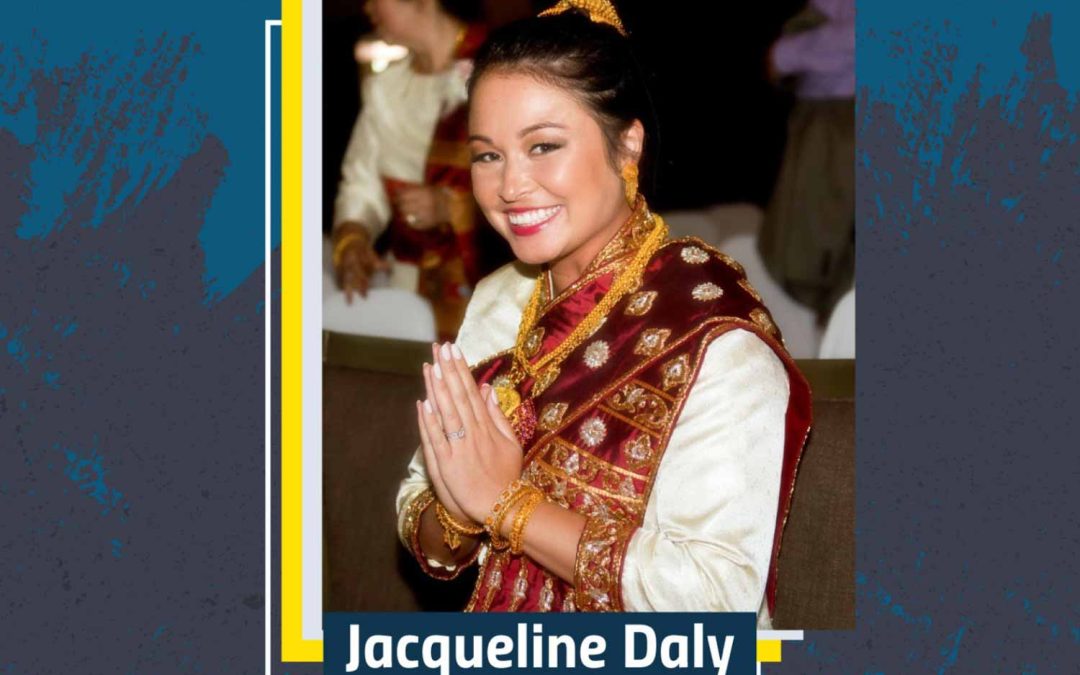
AAPI Heritage Month: Interview with Jacqueline Daly
To me, AAPI Heritage Month is a great time to reflect and celebrate my Asian heritage and all the family traditions that have made my life so culturally rich. I am very proud to be an Asian American. I think this is a great opportunity for communities to come together and learn about our diverse stories through a more inclusive lens.
